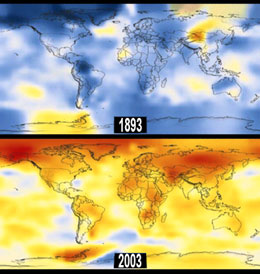Climate change is a “threat to society” says largest scientific body
Climate change is a “threat to society” says largest scientific body
mongabay.com
February 18, 2007
The world’s largest scientific society today voiced concern over global warming, calling it a “threat to society.” It was the first consensus statement of the board of the American Association for the Advancement of Science (AAAS) on climate change. The announcement comes sixteen days after the International Panel on Climate Change (IPCC) issued its most recent report on global change.
Meeting in San Francisco at its annual conference, AAAS released a statement confirming that “global climate change caused by human activities is occurring now, and it is a growing threat to society.” Noting that the present atmospheric carbon-dioxide level is higher than it has been for at least 650,000 years, AAAS said “the average temperature of the Earth is heading for levels not experienced for millions of years.”
“Scientists are observing rapid melting of glaciers, destabilization of major ice sheets, rising sea levels, shifts in species ranges, and increased frequency of weather extremes,” AAAS President John P. Holdren wrote. “As droughts, heat waves, floods, wildfires, and severe storms intensify, damages to ecosystems and human society are growing apace.”
To highlight the risk of climate change, AAAS invited seven members from the community of Shishmaref, Alaska, to demonstrate the impact of warmer temperatures on their 4,000-year-old Inupiaq village. The group aired a video that showed beach erosion and thinning ice.
 This color-coded map shows a progression of changing global surface temperatures from 1893 to 2003. Dark red indicates the greatest warming and dark blue indicates the greatest cooling. Modified from a NASA animation. . |
“The fish are way up river and gone somewhere else,” said Shishmaref Mayor Stanley Tocktoo. “With the permafrost nowadays, we bury our fish and food very shallow because the sun is so hot, the sun might heat up the sand and then spoil all our food. That’s what I’m worried about.”
Tocktoo added that the hunting and fishing seasons have shifted and that residents are seeking government funds to relocate the village.
AAAS followed up the release of the statement with a “town hall” meeting for the general public. The organization said it was expecting 1,000 K-12 teachers, students, scientists, and others to take part in the gathering.
Founded in 1848, AAAS is the world’s largest general scientific society, and publisher of the journal, Science. The society serves 262 affiliated societies and academies of science, and reaches 10 million individuals.
The IPCC report was released in Paris February 2, 2007. It said that said global warming was “very likely” — with a greater than 90 percent level of confidence — caused by human activity, specifically man’s burning of fossil fuels. The report made it clear that most of the currently observed global warming is not natural. The panel predicted temperature rises of 1.8-4.0 degrees C (3.2-7.2 degrees Fahrenheit) by the year 2100 and sea level rise of 18-58 cm (7-23 inches) by the end of the century. Should polar ice sheets continue to melt, oceans could rise by a further 8-20 cm (3.9-7.8 inches), said the report.
This article is based on a news release from AAAS and used information from previous mongabay.com articles.